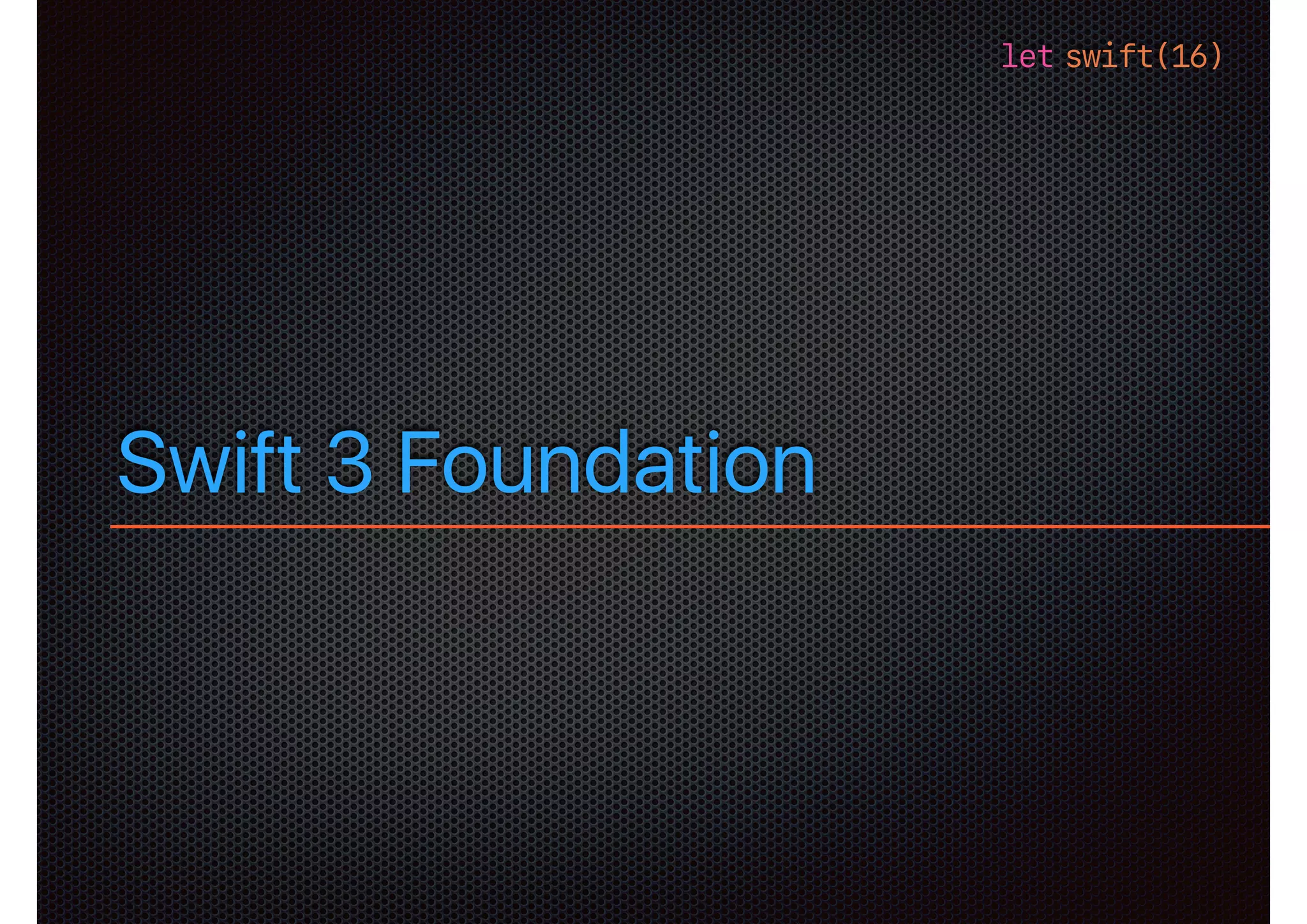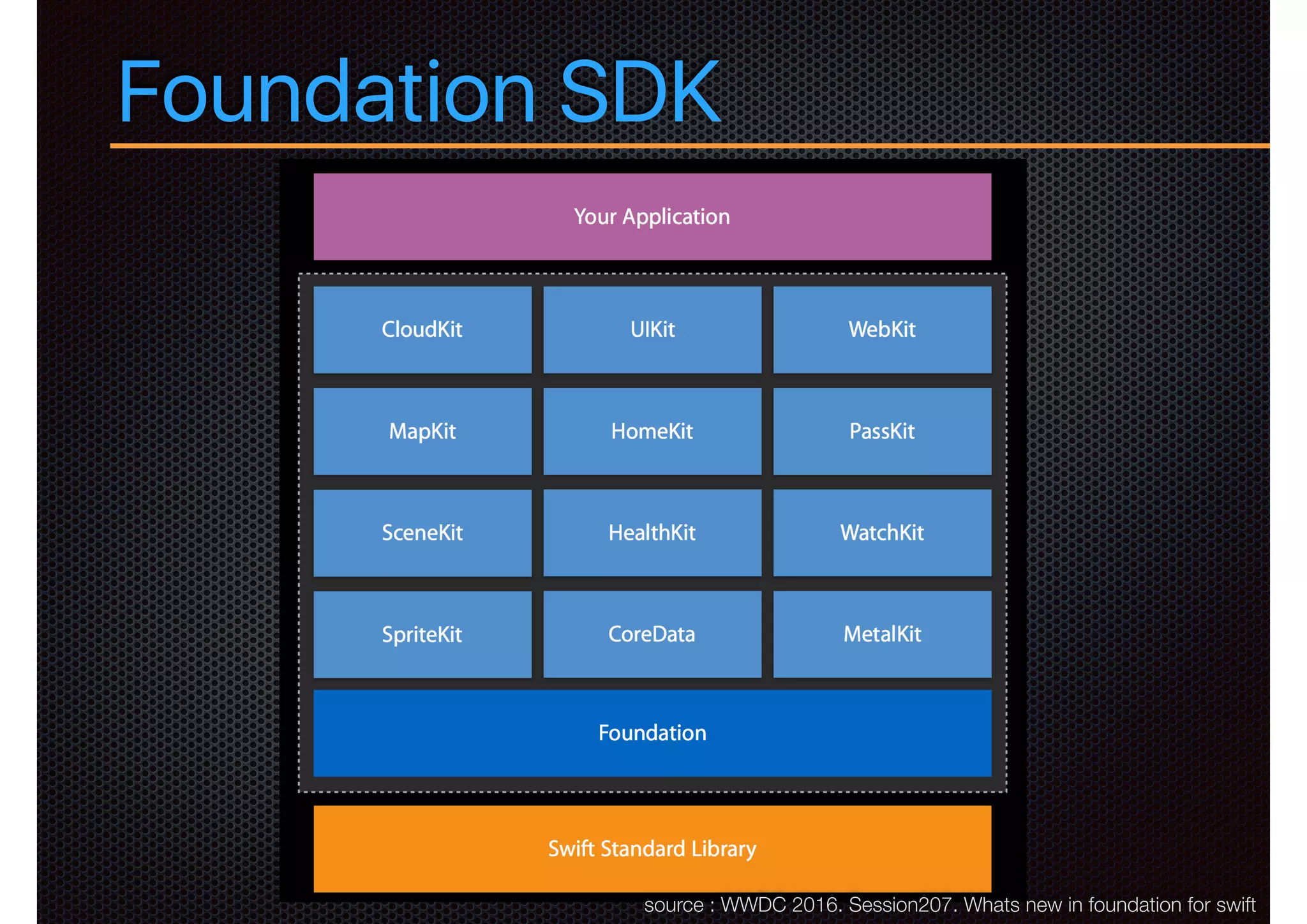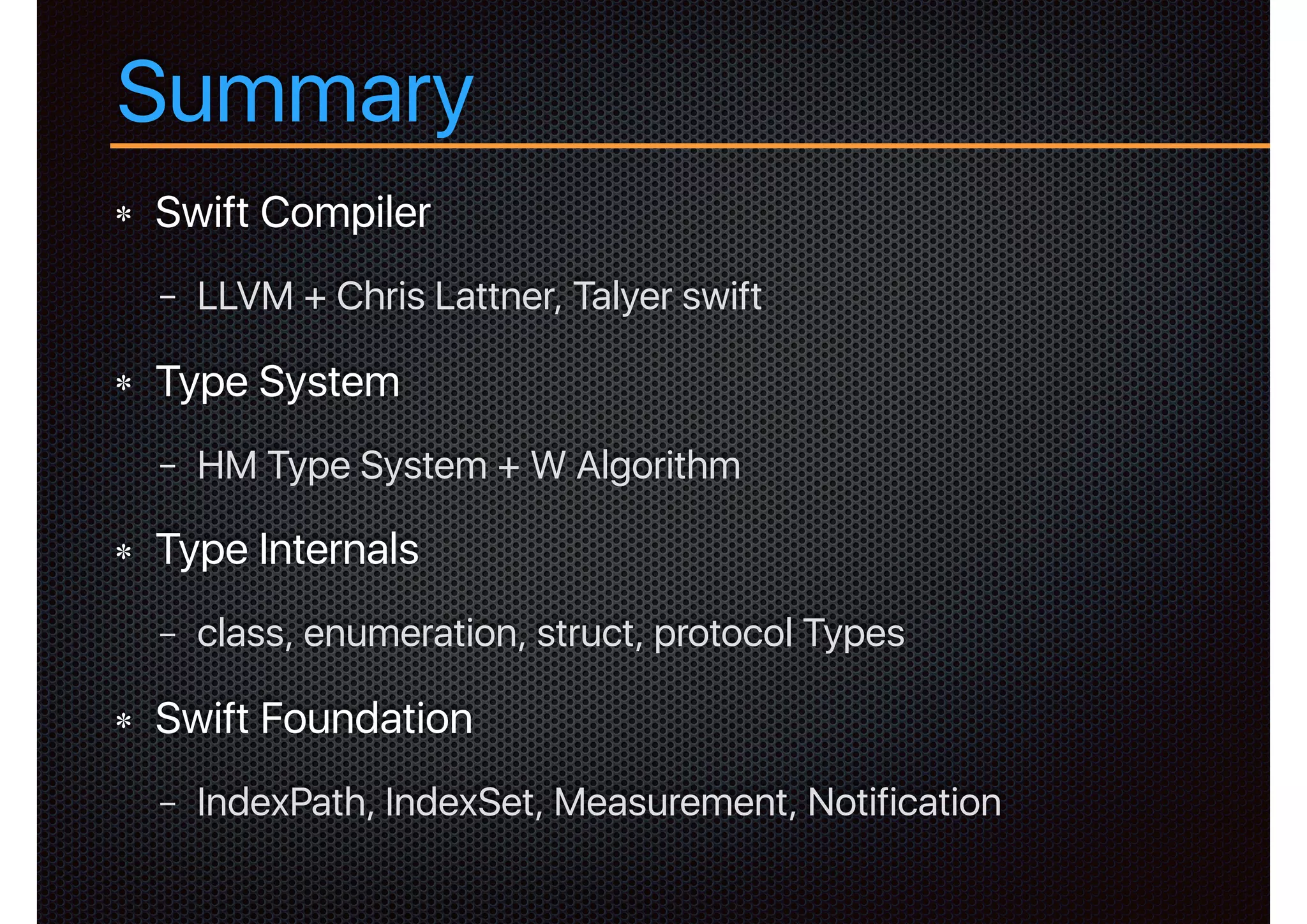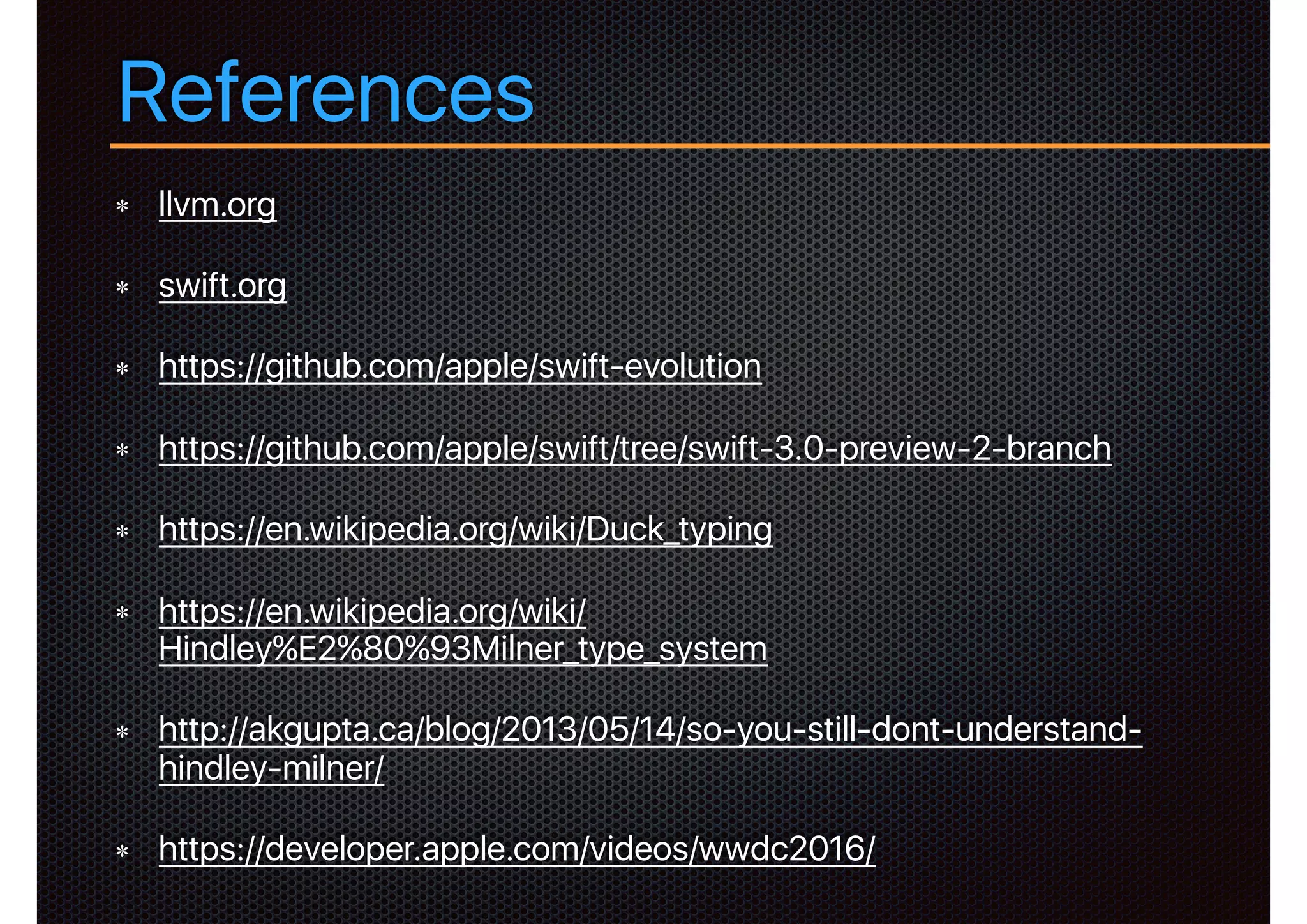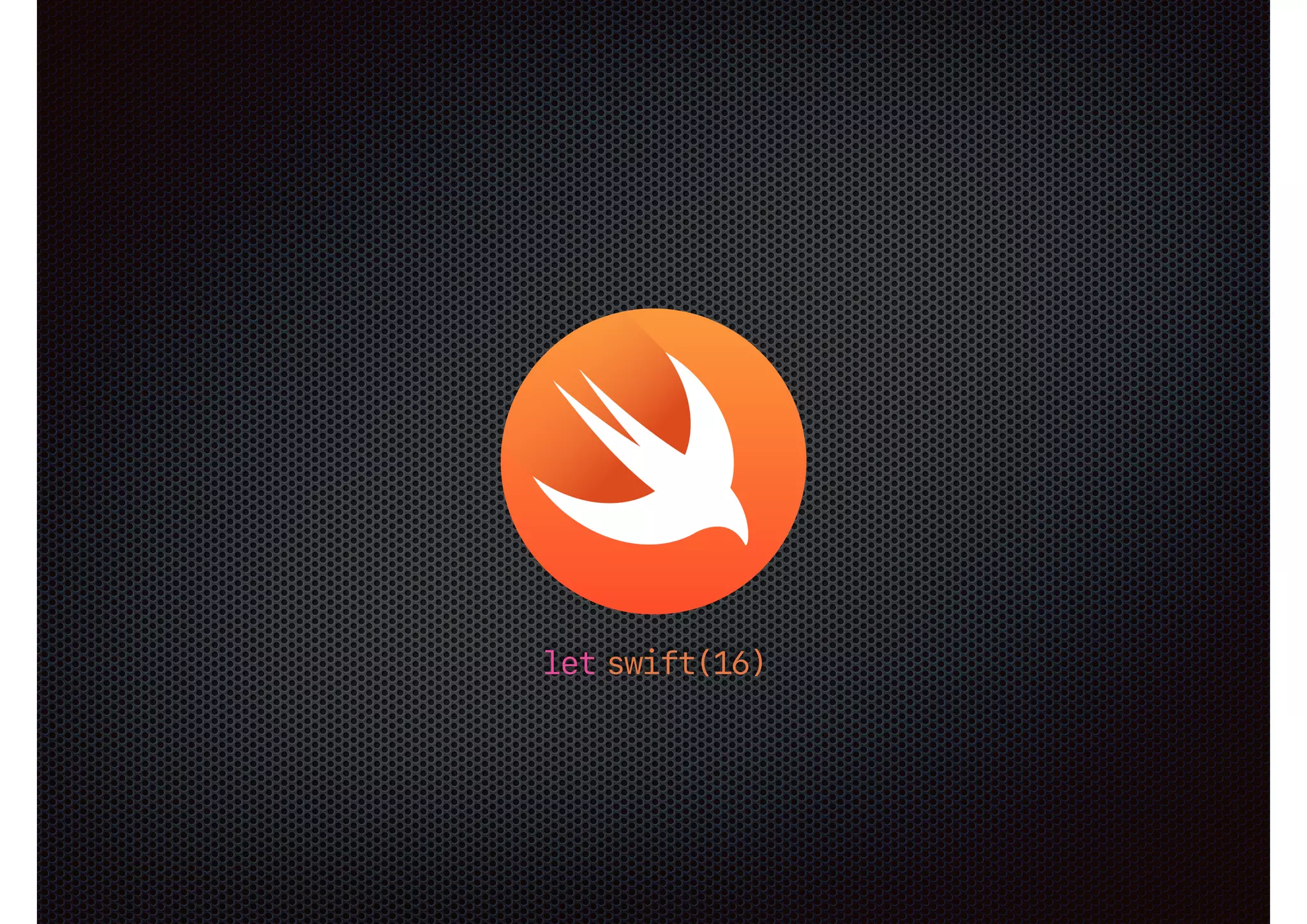The document provides an overview of the Swift Foundation framework. It discusses key types in Foundation like AffineTransform, CharacterSet, Data, Date, DateComponents, Decimal, FileManager, IndexPath, Measurement, Notification, NSError, URL, and URLComponents. The document also briefly mentions the purpose of each type.





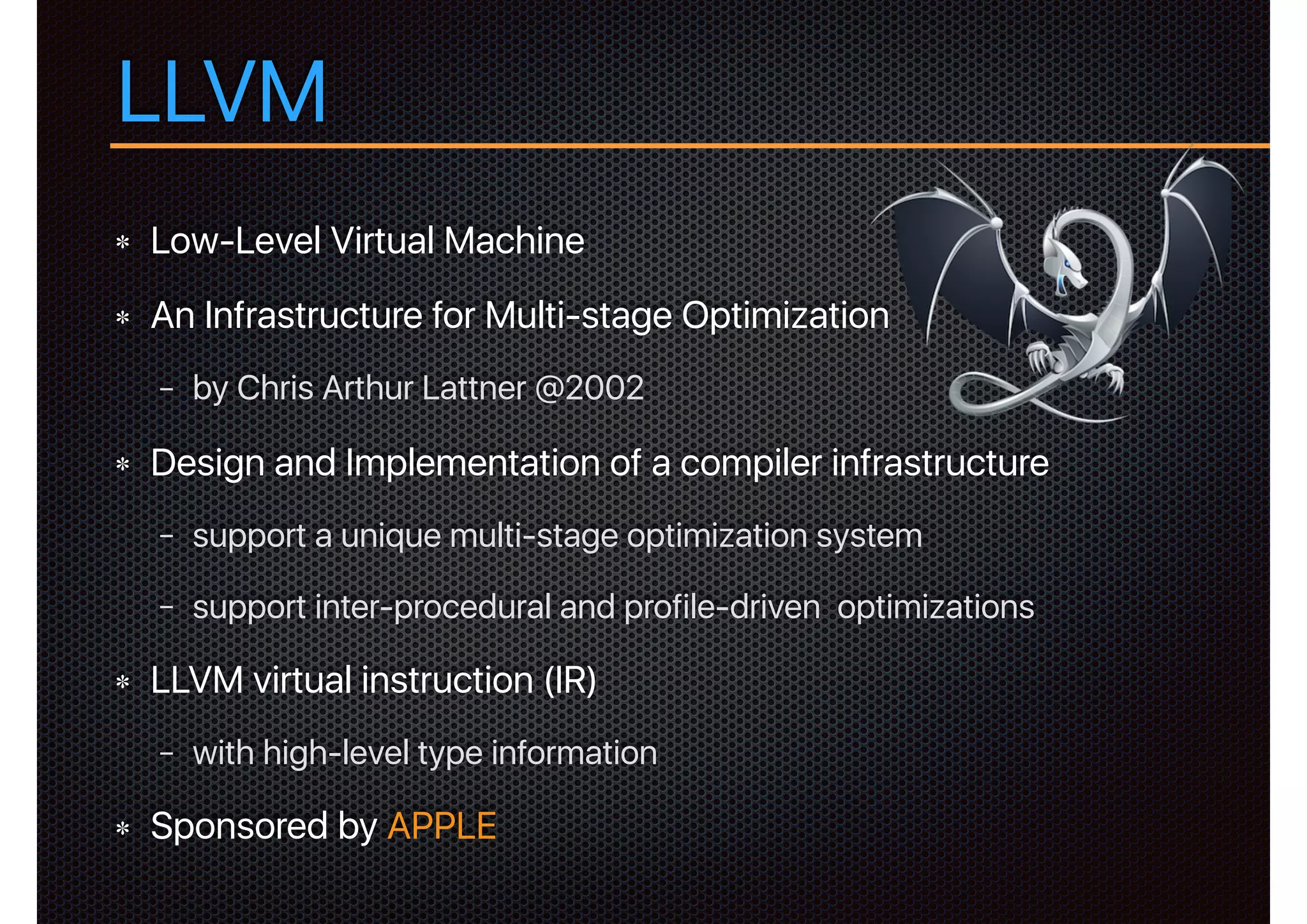

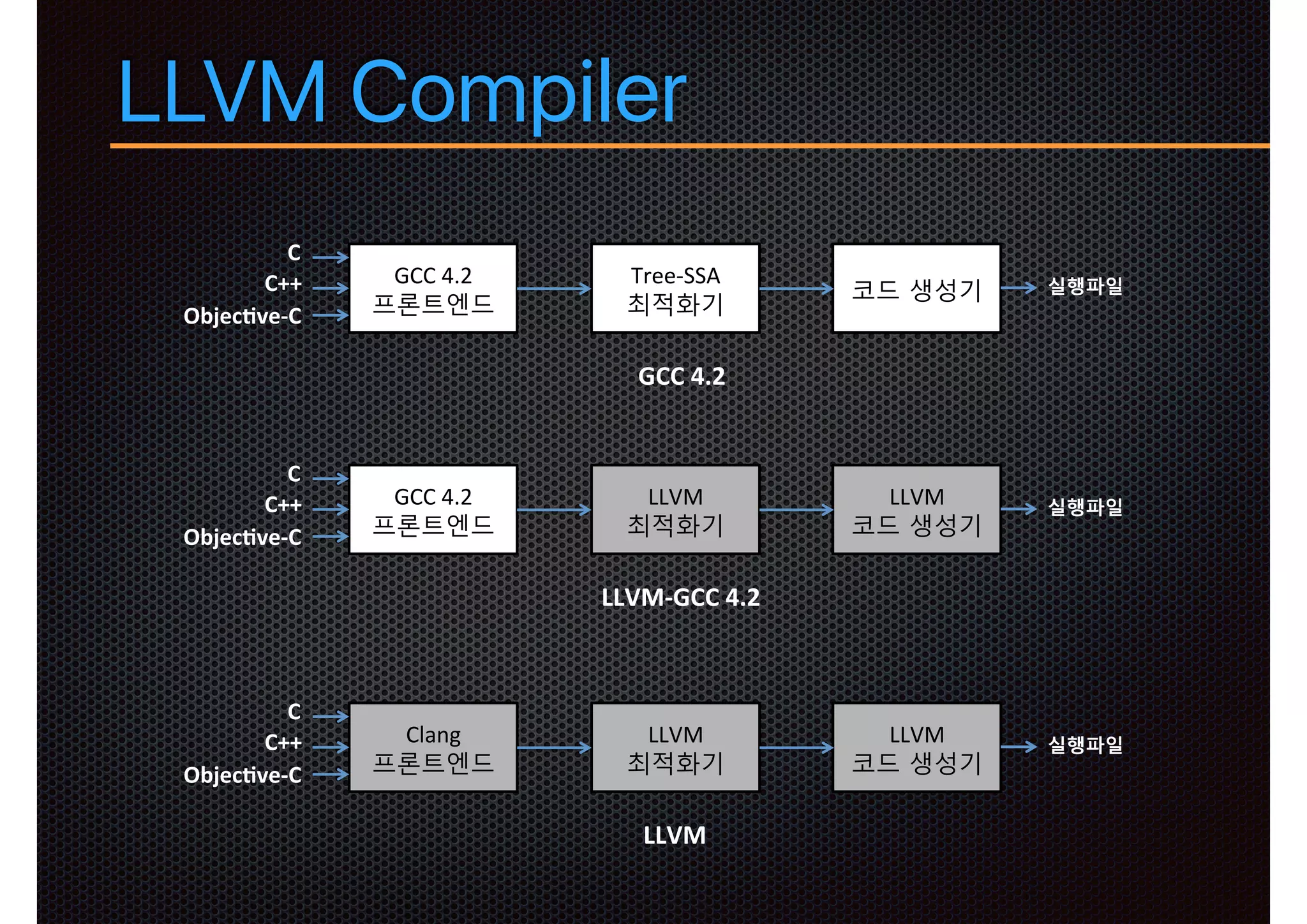

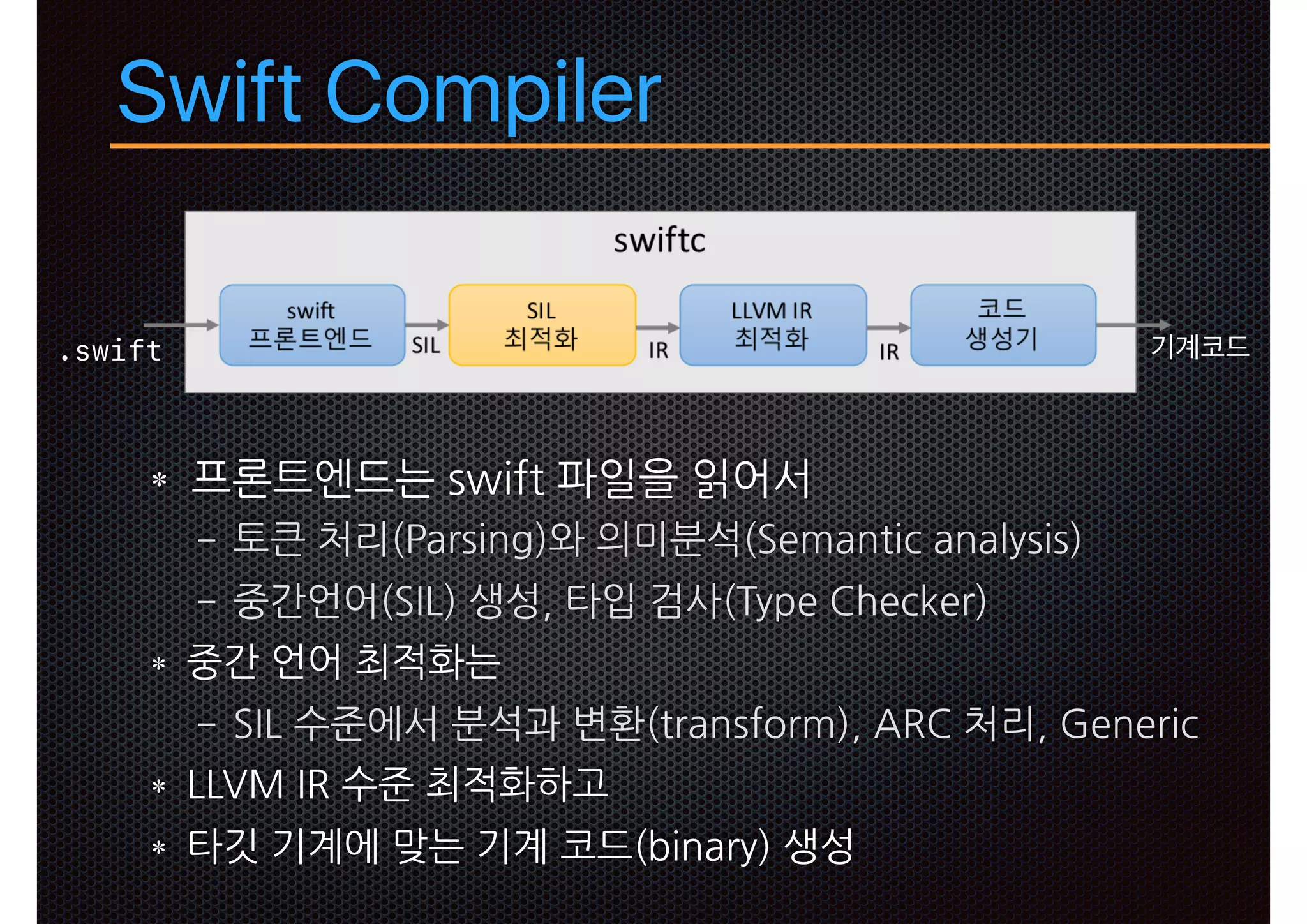
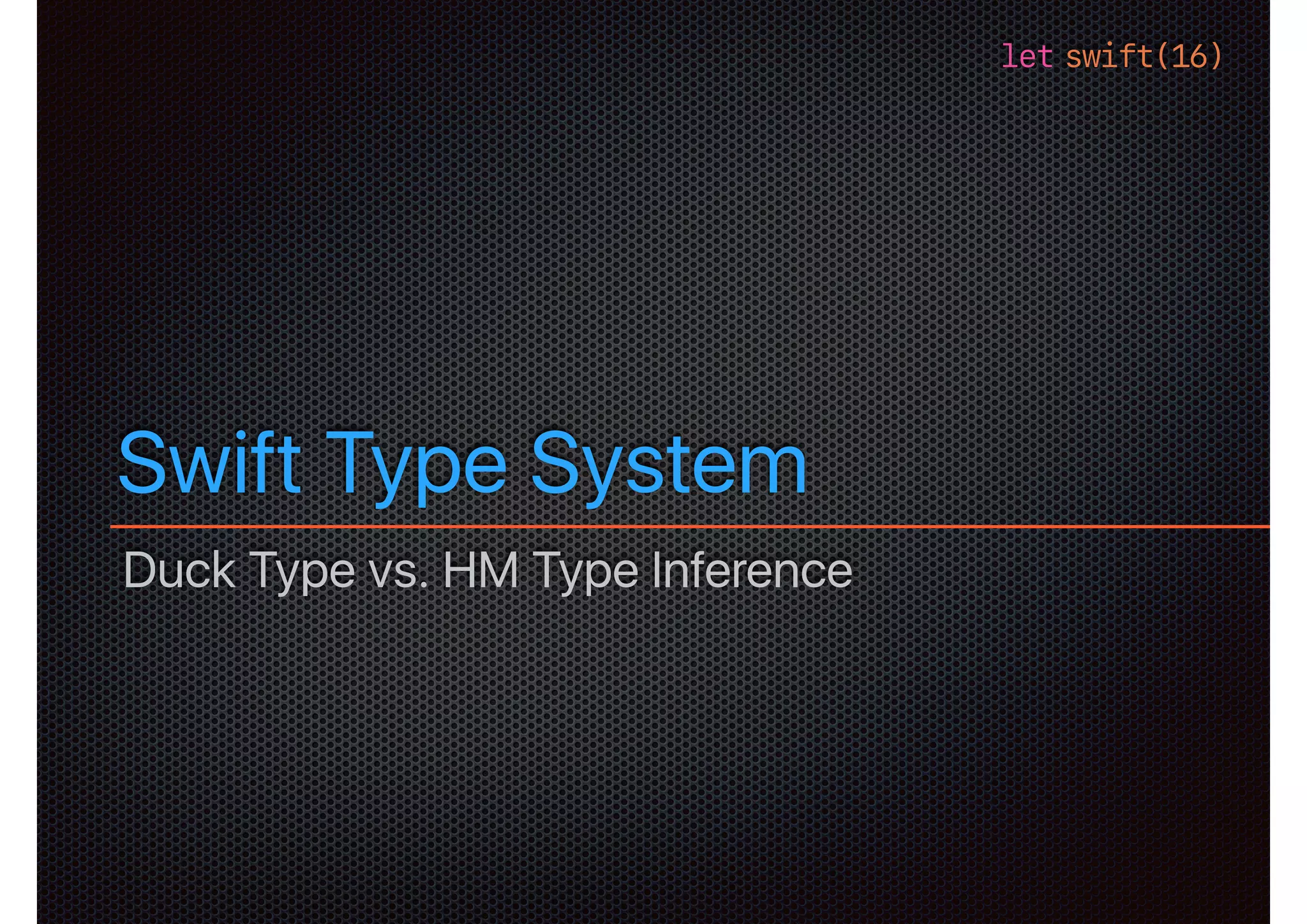
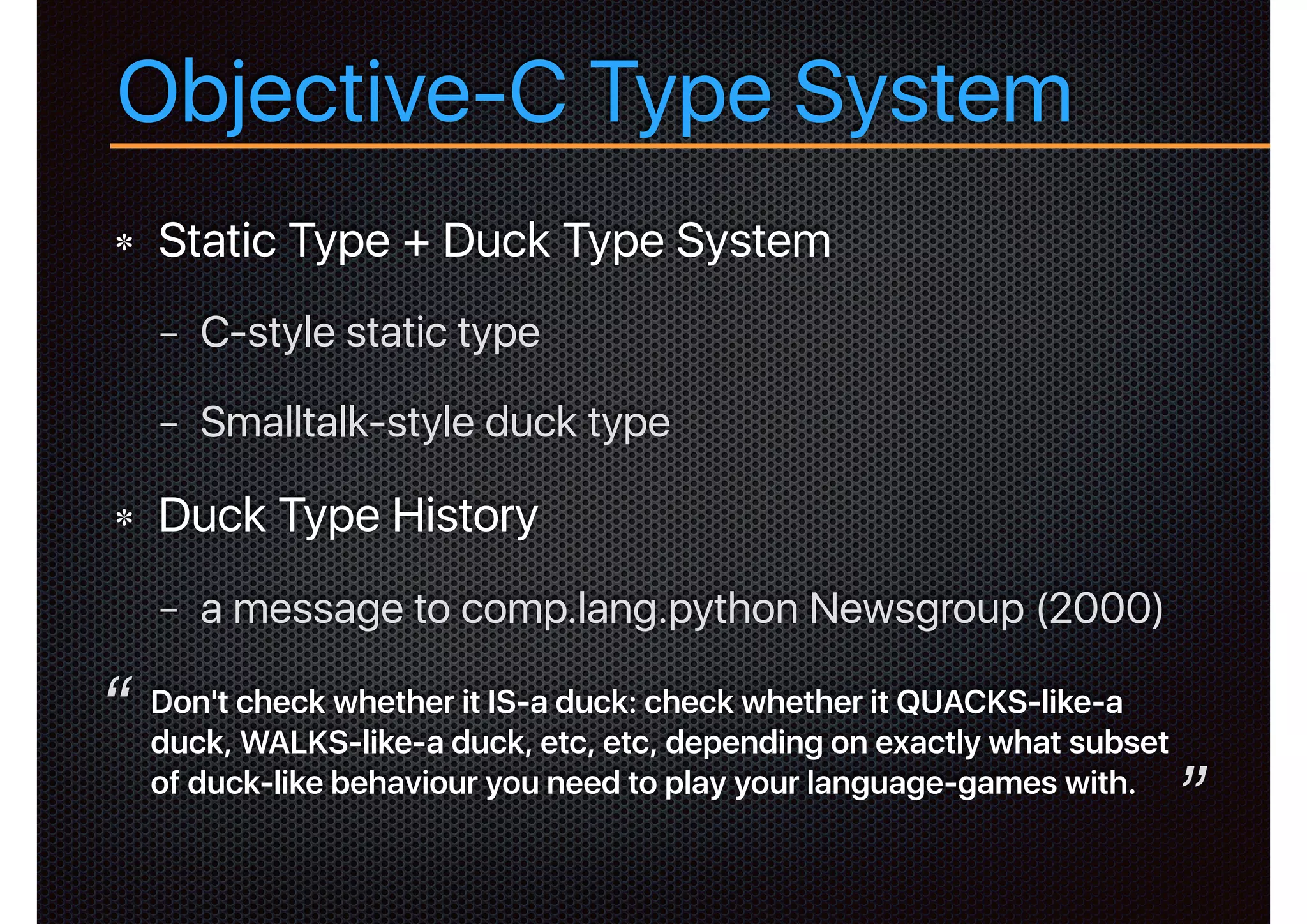
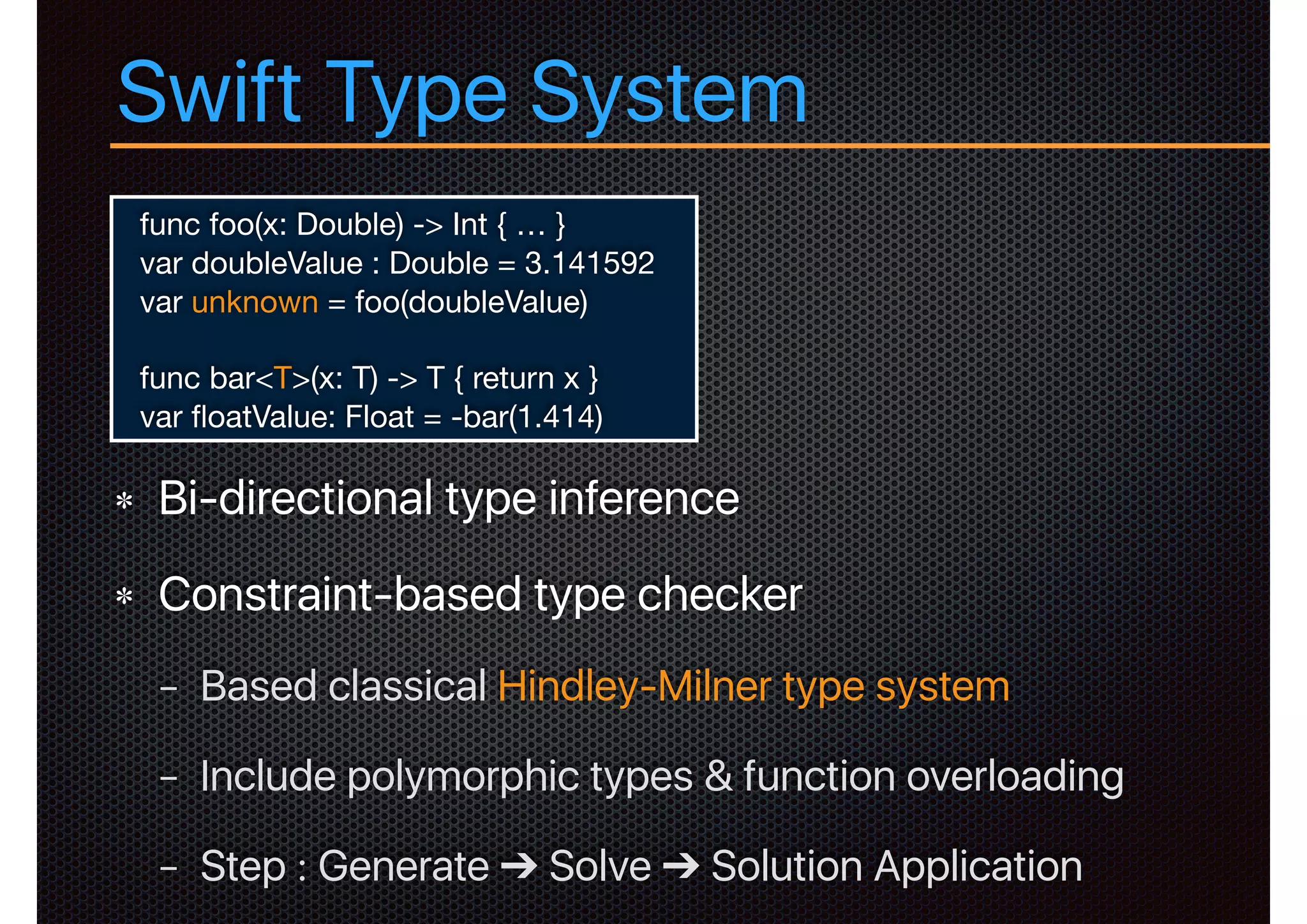
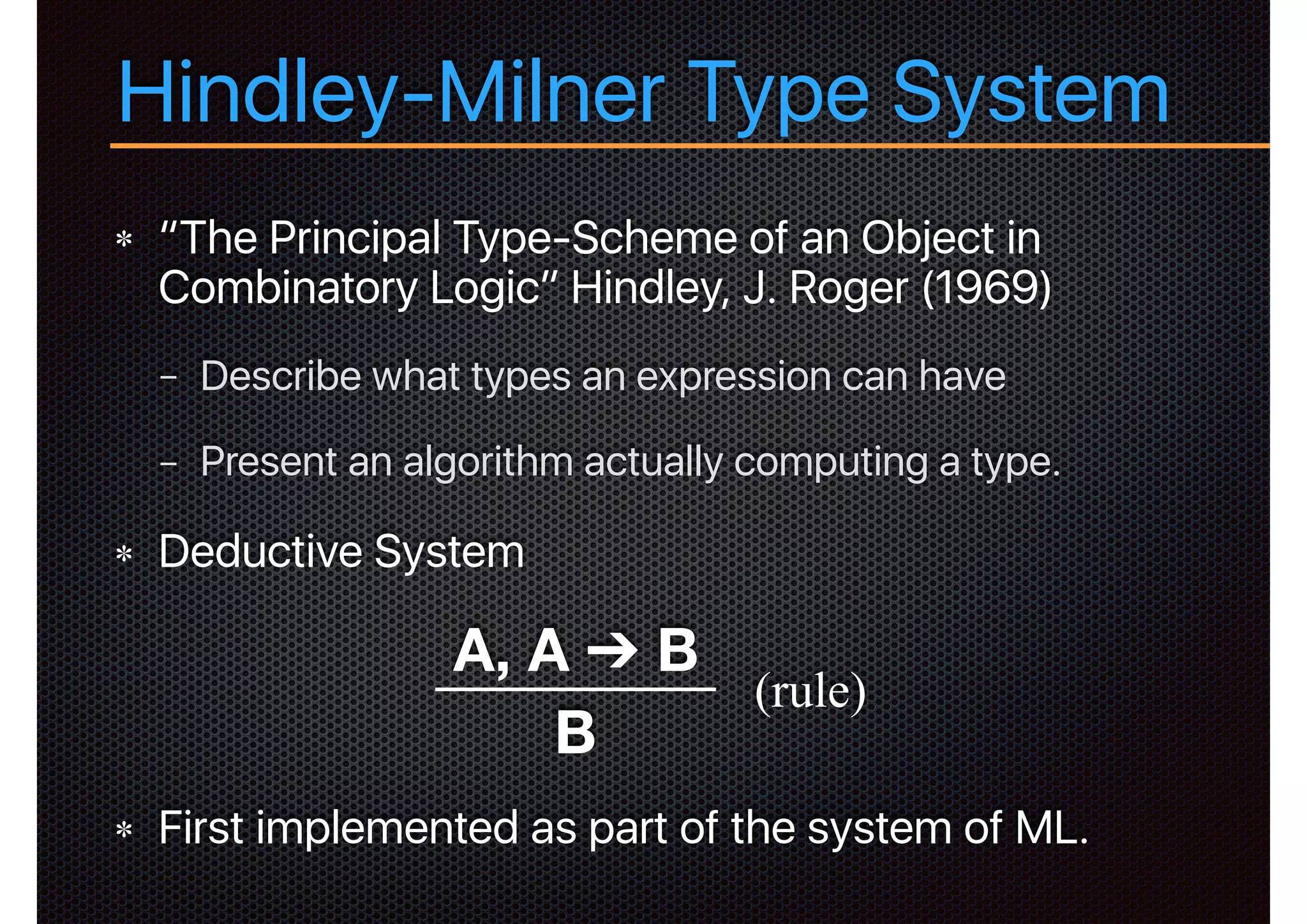
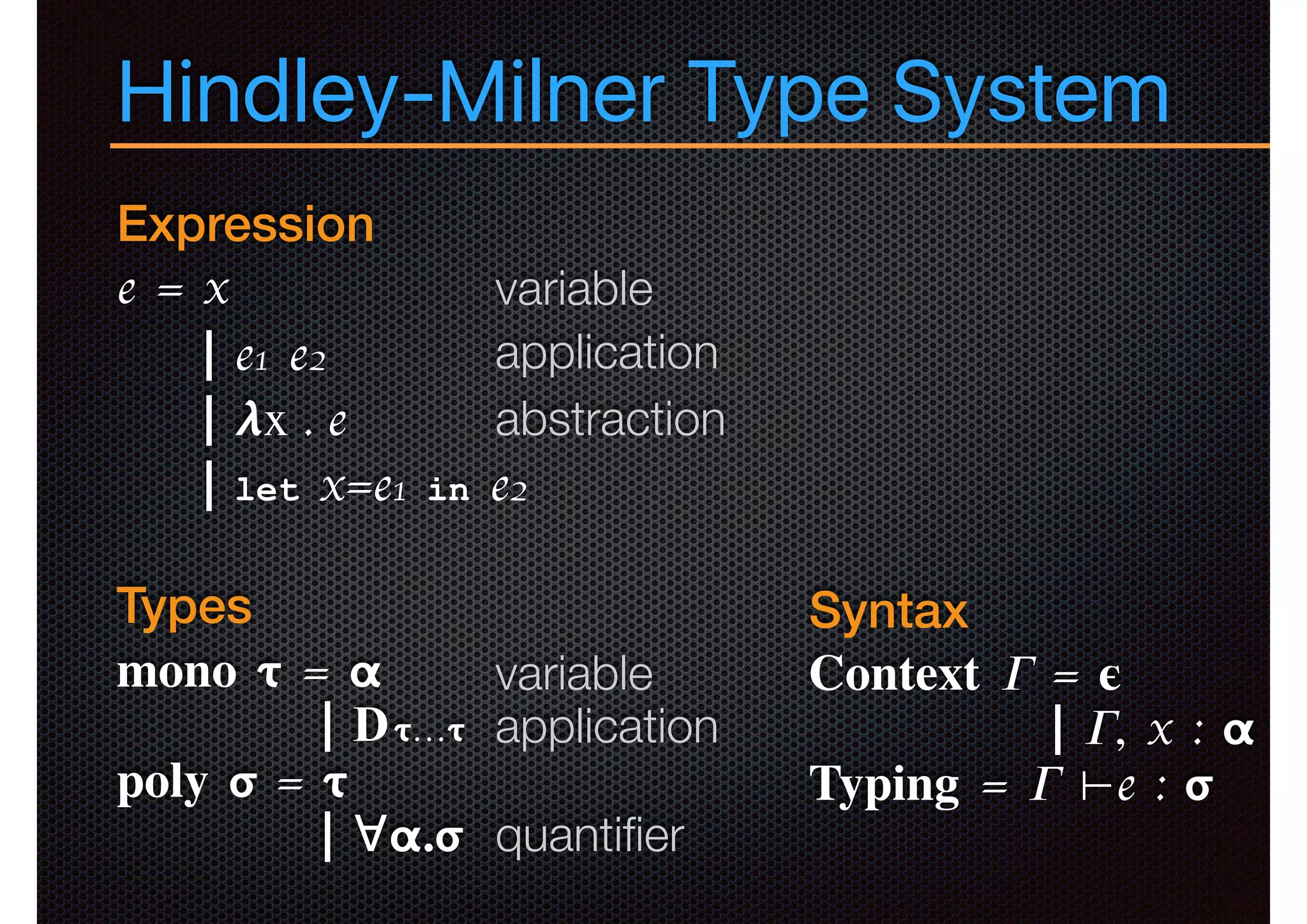
![Hindley-Milner Algorithm W
[Var]
[App]
[Abs]
[Let]](https://image.slidesharecdn.com/swiftinternalsshare-160710061044/75/Swift-internals-16-2048.jpg)
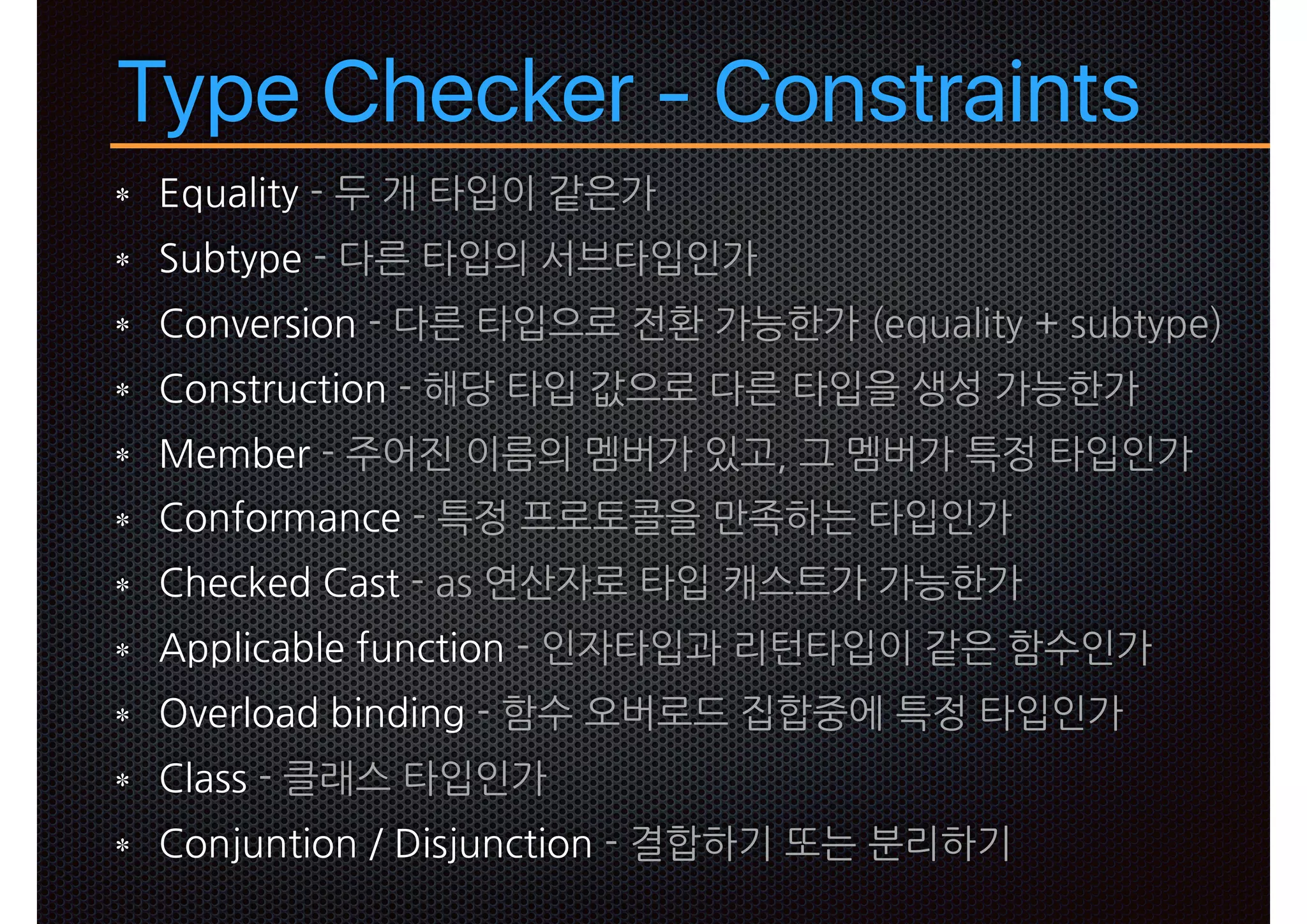
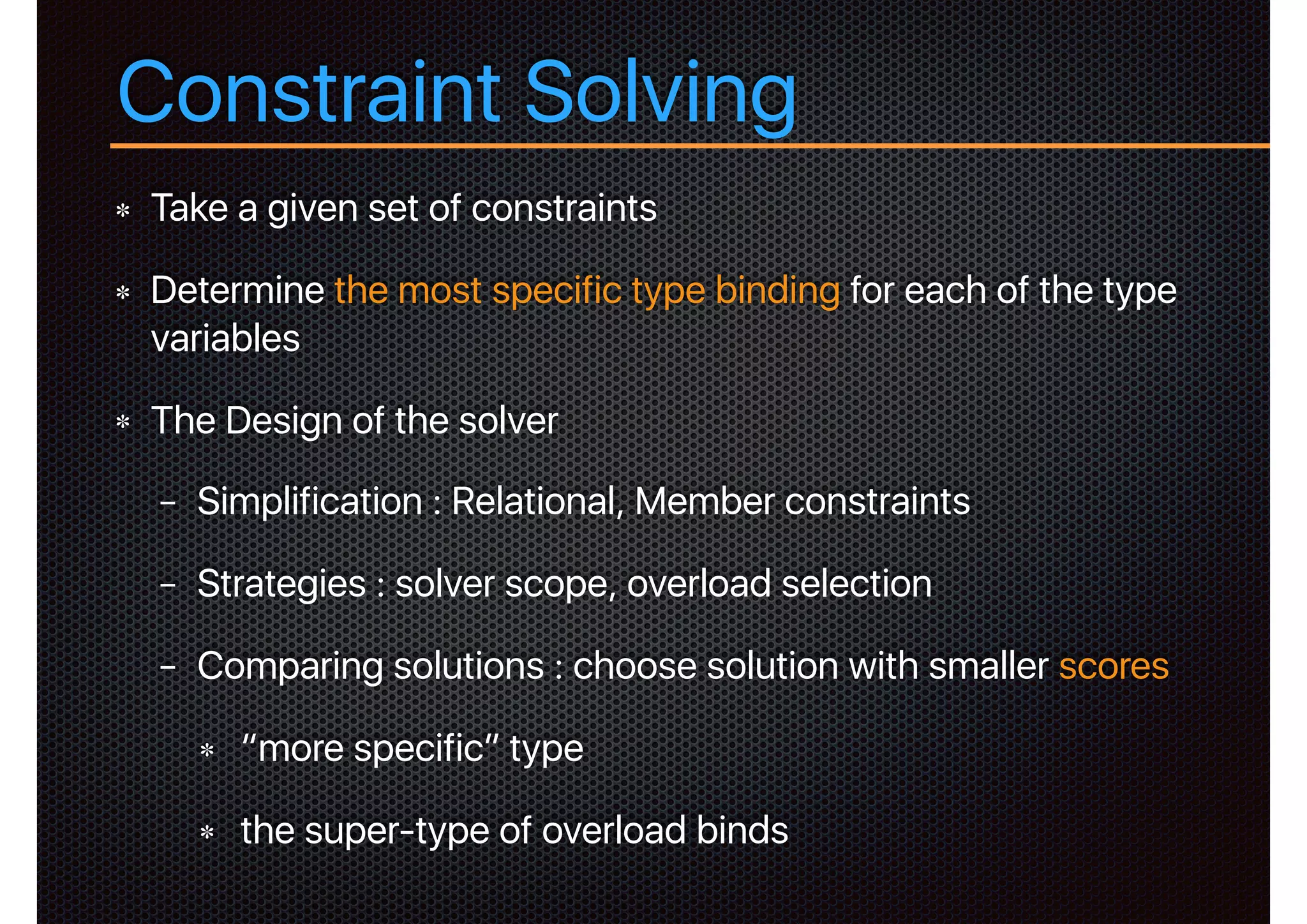

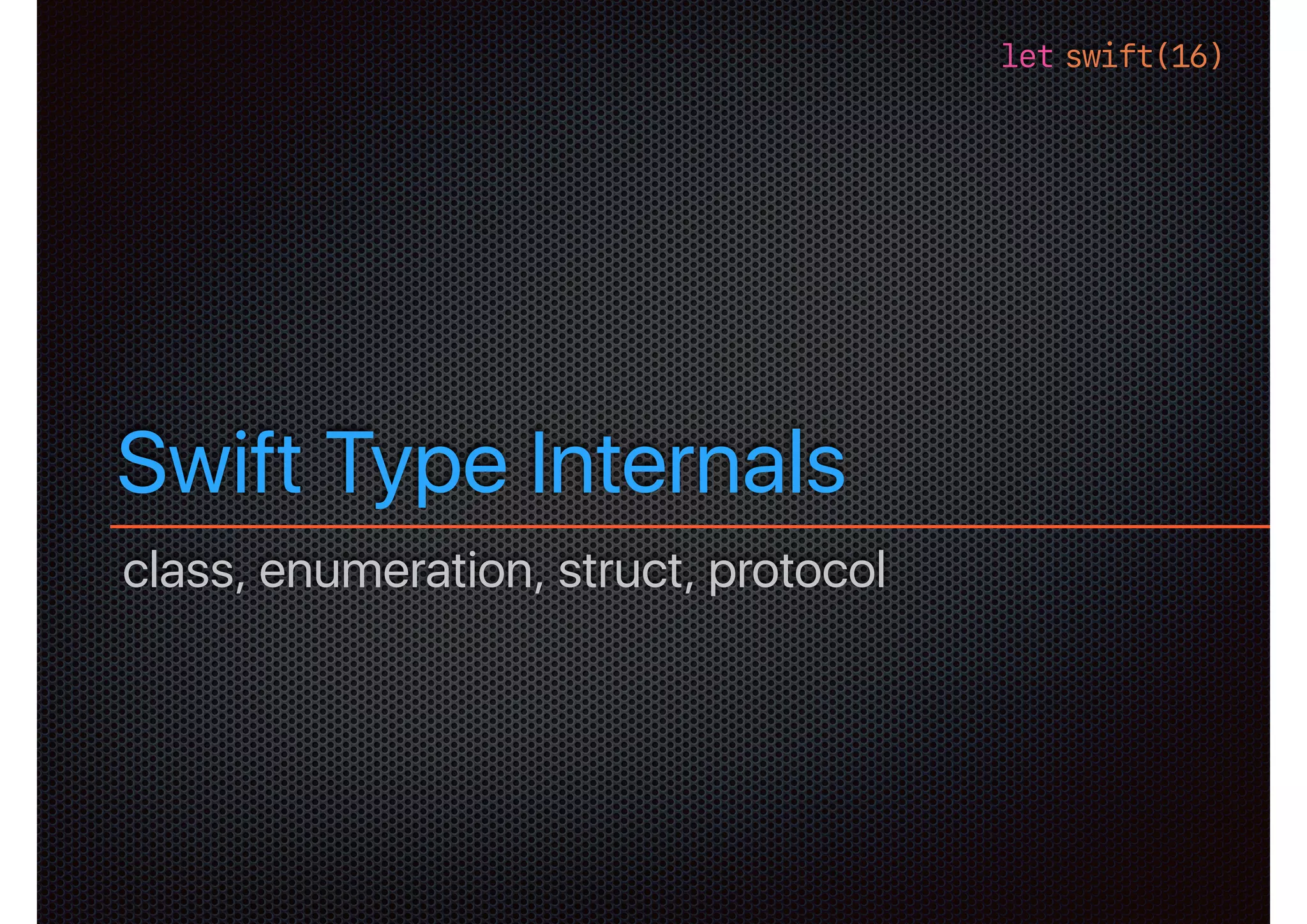
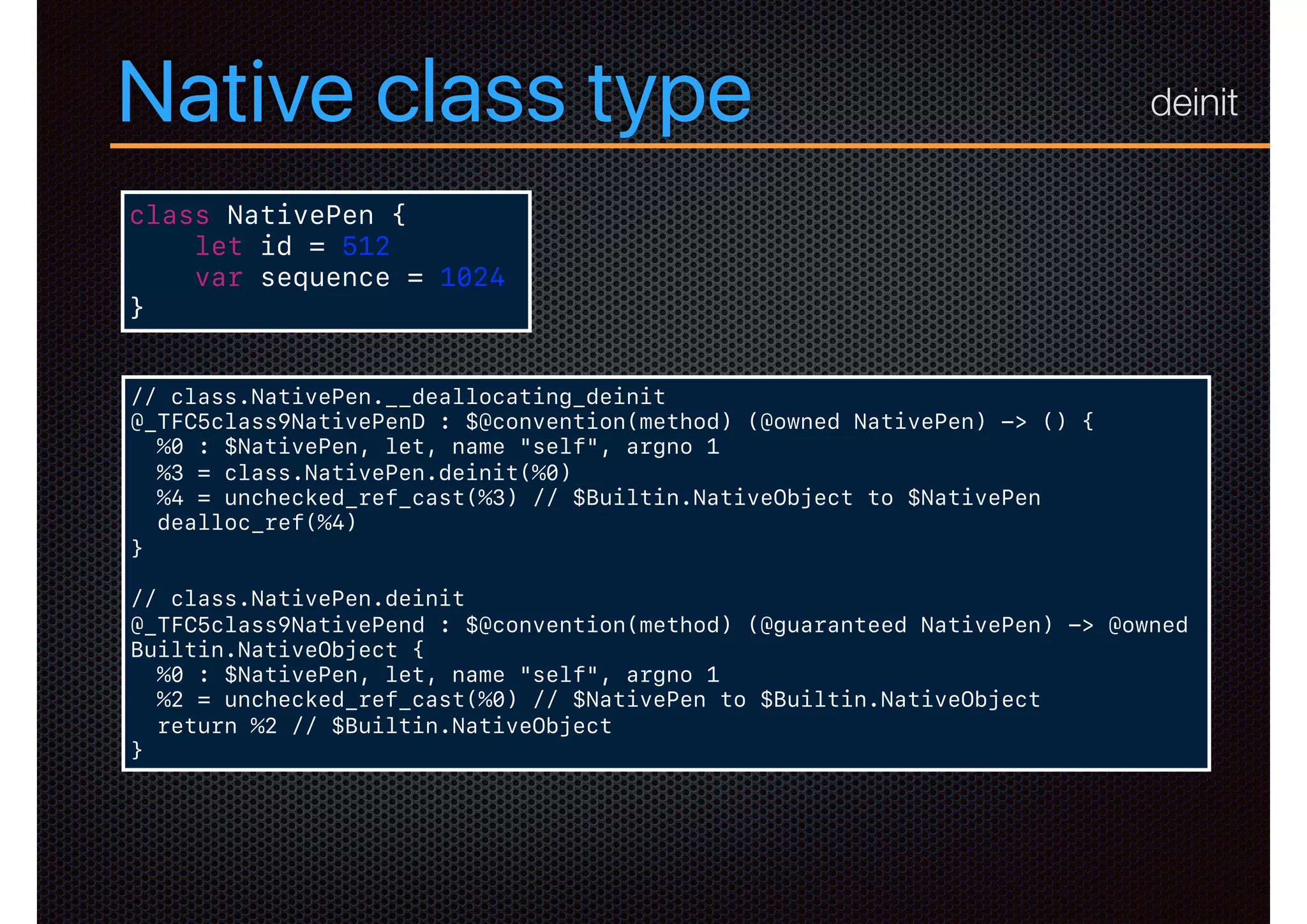
![Native class type
// class.NativePen.init () -> class.NativePen
@_TFC5class9NativePencfT_S0_ : $@convention(method) (@owned NativePen) -> @owned
NativePen {
%0 : $NativePen, let, name "self"
%2 = mark_uninitialized([rootself], %0)
%4 = metatype(Int.Type)
%5 = integer_literal($Builtin.Int2048, 512)
%6 = Swift.Int.init(%5, %4)
%7 = ref_element_addr(%2 : $NativePen, #NativePen.id)
assign(%6 to %7)
%10 = metatype(Int.Type)
%11 = integer_literal($Builtin.Int2048, 1024)
%12 = Swift.Int.init(%11, %10)
%13 = ref_element_addr(%2 : $NativePen, #NativePen.sequence)
assign (%12 to %13)
return %2 // $NativePen
}
// class.NativePen.__allocating_init () -> class.NativePen
@_TFC5class9NativePenCfT_S0_ : $@convention(thin) (@thick NativePen.Type) -> @owned
NativePen {
%1 = alloc_ref($NativePen)
%3 = class.NativePen.init(%1)
return %3 : $NativePen
}
init](https://image.slidesharecdn.com/swiftinternalsshare-160710061044/75/Swift-internals-22-2048.jpg)
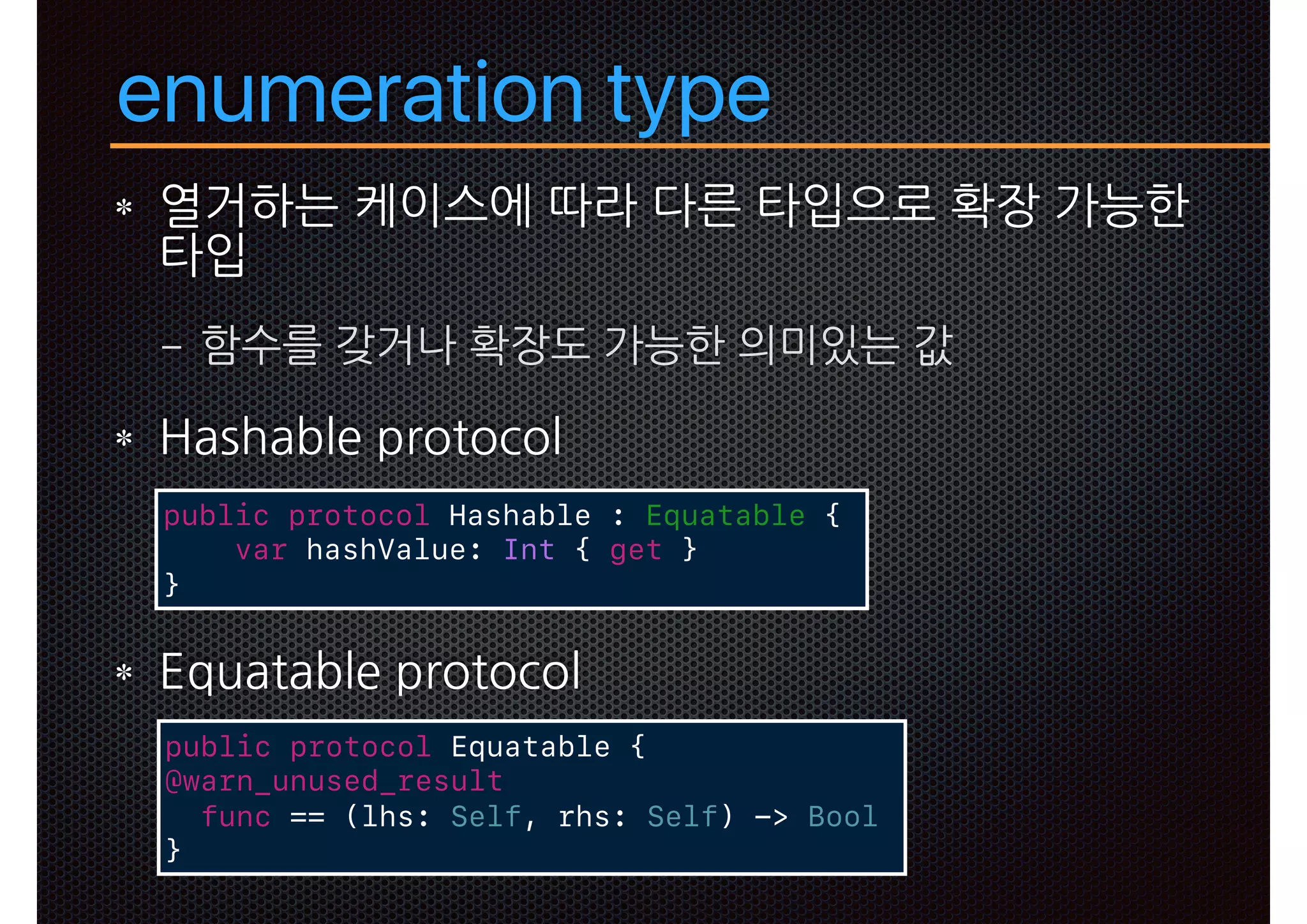
![enum type example
enum PenModels {
case BallPen
case NamePen
}
// enum.PenModels.hashValue.getter : Swift.Int
@_TFO4enum9PenModelsg9hashValueSi : $@convention(method) (PenModels) -> Int {
%2 = alloc_box($Int, var, name "index")
%3 = mark_uninitialized([var] %2#1 : $*Int)
switch_enum %0 : $PenModels,
case #PenModels.BallPen!enumelt: bb1,
case #PenModels.NamePen!enumelt: bb2
bb1:
%6 = metatype($@thin Int.Type)
%7 = integer_literal($Builtin.Int2048, 0)
%8 = Swift.Int.init(%7, %6) // (Builtin.Int2048, @thin Int.Type) -> Int
assign(%8 to %3)
br bb3
bb2:
%12 = metatype($@thin Int.Type)
%13 = integer_literal($Builtin.Int2048, 1)
%14 = Swift.Int.init(%13, %12) // (Builtin.Int2048, @thin Int.Type) -> Int
assign(%14 to %3)
br bb3
bb3:
%17 = load(%3 : $*Int)
%19 = Swift.Int.hashValue.getter(%17) // $@convention(method) (Int) -> Int
strong_release(%2#0) // $@box Int
return %19
}
getter](https://image.slidesharecdn.com/swiftinternalsshare-160710061044/75/Swift-internals-24-2048.jpg)
![enum type example
// protocol witness for static Swift.Equatable.== infix (A, A) -> Swift.Bool
@_TTWO4enum9PenModelss9EquatableS_ZFS1_oi2eefTxx_Sb :
$@convention(witness_method) (@in PenModels, @in PenModels, @thick
PenModels.Type) -> Bool {
%3 = load(%0 : $*PenModels)
%4 = load(%1 : $*PenModels)
%6 = enum.== infix(%3, %4)
return %6 // $Bool
}
// protocol witness for Swift.Hashable.hashValue.getter : Swift.Int
@_TTWO4enum9PenModelss8HashableS_FS1_g9hashValueSi :
$@convention(witness_method) (@in_guaranteed PenModels) -> Int {
%1 = alloc_stack($PenModels)
copy_addr(%0 to [initialization] %1 : $*PenModels)
%3 = load(%1 : $*PenModels)
%5 = enum.PenModels.hashValue.getter(%3)
dealloc_stack(%1 : $*PenModels)
return %5 // $Int
}
sil_witness_table PenModels: Equatable module enum {
method #Equatable."=="!1:
@_TTWO4enum9PenModelss9EquatableS_ZFS1_oi2eefTxx_Sb
}
sil_witness_table PenModels: Hashable module enum {
base_protocol Equatable: PenModels: Equatable module enum
method #Hashable.hashValue!getter.1:
@_TTWO4enum9PenModelss8HashableS_FS1_g9hashValueSi
}
Protocol Witness Table](https://image.slidesharecdn.com/swiftinternalsshare-160710061044/75/Swift-internals-25-2048.jpg)
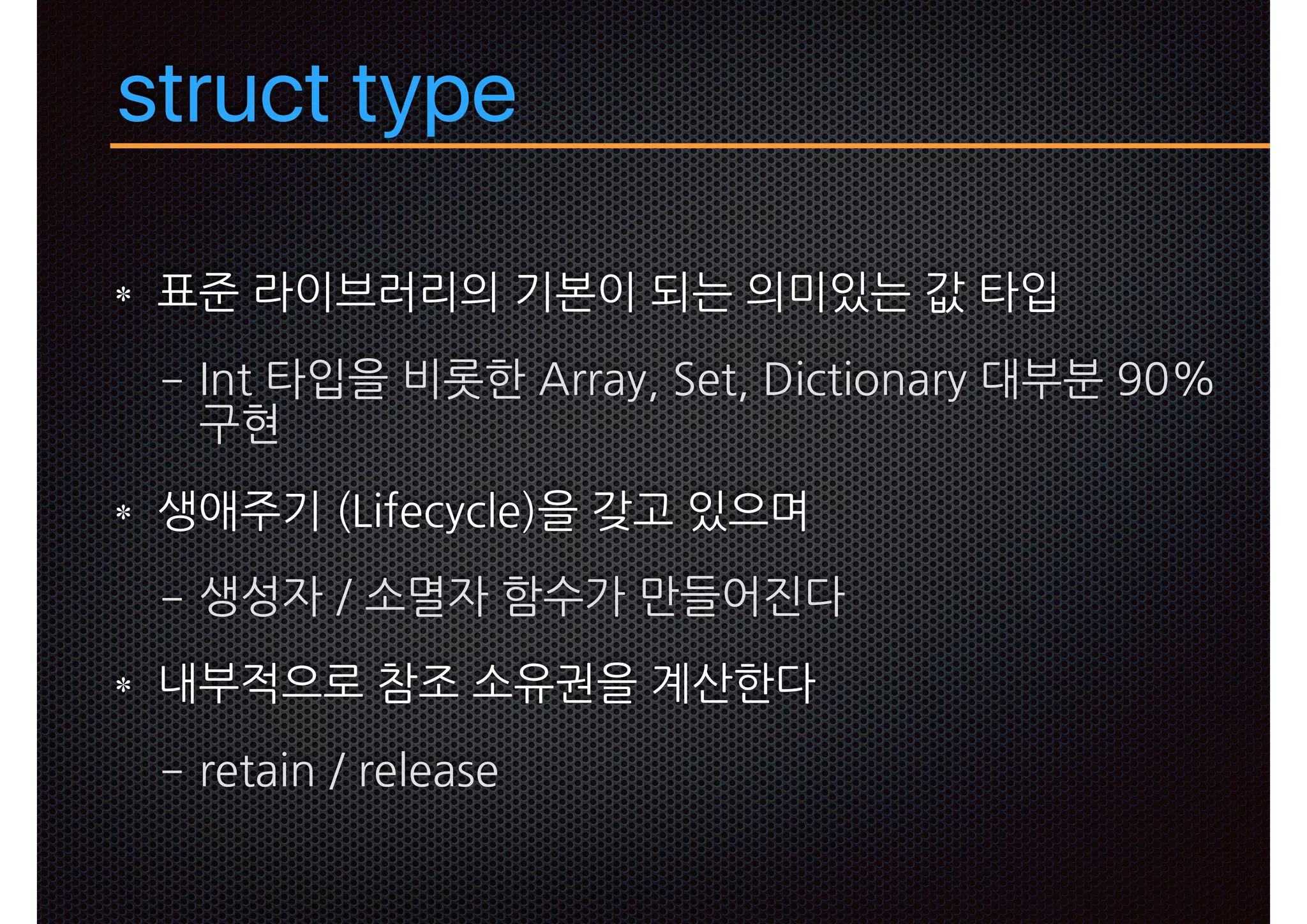
![struct type - let example
struct Car {
let model = "apple"
}
// struct.Car.init () -> struct.Car
@_TFV6struct3CarCfT_S0_ : $@convention(thin) (@thin Car.Type) -> @owned Car {
%1 = alloc_box($Car, var, name "self", argno 1)
%2 = mark_uninitialized([rootself] %1#1 : $*Car)
%4 = metatype($@thin String.Type)
%5 = string_literal(utf8 "apple")
%6 = integer_literal($Builtin.Word, 5)
%7 = integer_literal($Builtin.Int1, -1)
%8 = Swift.String.init(%5, %6, %7, %4)
%9 = struct_element_addr(%2 : $*Car, #Car.model)
assign(%8 to %9 : $*String)
%11 = load(%2 : $*Car)
retain_value(%11 : $Car)
strong_release(%1#0 : $@box Car)
return %11
}
// struct.Car.model.getter : Swift.String
@_TFV6struct3Carg5modelSS : $@convention(method) (@guaranteed Car) -> @owned String {
%2 = struct_extract(%0 : $Car, #Car.model)
retain_value(%2 : $String)
return %2
}](https://image.slidesharecdn.com/swiftinternalsshare-160710061044/75/Swift-internals-27-2048.jpg)
![struct type - var example
struct Car {
var driver = "tim"
}
// struct.Car.init (driver : Swift.String) -> struct.Car
@_TFV6struct3CarCfT6driverSS_S0_ : $@convention(thin) (@owned String, @thin Car.Type)
-> @owned Car {
%2 = struct.$Car(%0 : $String)
return %2
}
// struct.Car.init () -> struct.Car
@_TFV6struct3CarCfT_S0_ : $@convention(thin) (@thin Car.Type) -> @owned Car {
%1 = alloc_box($Car, var, name "self", argno 1)
%2 = mark_uninitialized([rootself] %1#1 : $*Car)
%4 = metatype($@thin String.Type)
%5 = string_literal(utf8 "tim")
%6 = integer_literal($Builtin.Word, 3)
%7 = integer_literal($Builtin.Int1, -1)
%8 = Swift.String.init(%5, %6, %7, %4)
%9 = struct_element_addr(%2 : $*Car, #Car.driver)
assign(%8 to %9 : $*String)
%11 = load(%2 : $*Car)
retain_value(%11 : $Car)
strong_release(%1#0 : $@box Car)
return %11
}
init](https://image.slidesharecdn.com/swiftinternalsshare-160710061044/75/Swift-internals-28-2048.jpg)
![struct type - var example
// struct.Car.driver.getter : Swift.String
@_TFV6struct3Carg6driverSS : $@convention(method) (@guaranteed Car) -> @owned String {
%2 = struct_extract(%0 : $Car, #Car.driver)
retain_value(%2 : $String)
return %2
}
// struct.Car.driver.setter : Swift.String
@_TFV6struct3Cars6driverSS : $@convention(method) (@owned String, @inout Car) -> () {
%3 = alloc_box($Car, var, name "self", argno 2)
copy_addr(%1 to [initialization] %3#1 : $*Car)
retain_value(%0 : $String)
%6 = struct_element_addr(%3#1 : $*Car, #Car.driver)
assign(%0 to %6 : $*String)
copy_addr(%3#1 to %1 : $*Car)
strong_release(%3#0 : $@box Car)
release_value(%0 : $String)
%11 = tuple ()
return %11
}
// struct.Car.driver.materializeForSet : Swift.String
@_TFV6struct3Carm6driverSS : $@convention(method) (Builtin.RawPointer, @inout
Builtin.UnsafeValueBuffer, @inout Car) -> (Builtin.RawPointer, Optional<@convention(thin)
(Builtin.RawPointer, inout Builtin.UnsafeValueBuffer, inout Car, @thick Car.Type) -> ()>) {
%3 = struct_element_addr(%2 : $*Car, #Car.driver)
%4 = address_to_pointer(%3 : $*String to $Builtin.RawPointer)
%5 = enum $Optional<@convention(thin) (Builtin.RawPointer, inout
Builtin.UnsafeValueBuffer, inout Car, @thick Car.Type) -> ()>, #Optional.None!enumelt
%6 = tuple (%4 : $Builtin.RawPointer, %5 : $Optional<@convention(thin)
(Builtin.RawPointer, inout Builtin.UnsafeValueBuffer, inout Car, @thick Car.Type) -> ()>)
return %6 : $(Builtin.RawPointer, Optional<@convention(thin) (Builtin.RawPointer, inout
Builtin.UnsafeValueBuffer, inout Car, @thick Car.Type) -> ()>)
}
getter/setter](https://image.slidesharecdn.com/swiftinternalsshare-160710061044/75/Swift-internals-29-2048.jpg)
